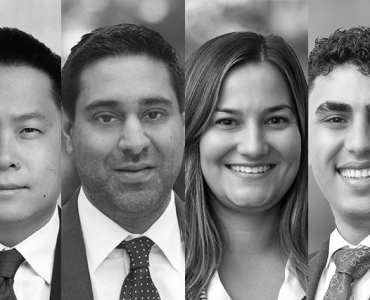
June 2025: In our second instalment of our Battle of the Practices series (the first Battle is here), lawyers from our US Capital Markets and Commercial Litigation teams share insights into their areas of the law, and the skills that help lawyers thrive on their teams. Discover which area of law might be the best fit for you and get to know our people and our work.
In the ring this time: Laura Garr, a partner in our New York Commercial Litigation (CL) team is pitted against Houston Capital Markets (CM) partner Jason Rocha, with help from Chicago CL associate Patrick Conlon and New York CM associate Elle Cotzomi. Let the battle commence!
Round 1: Battle of the pitch
Give us your elevator pitch for working in your area of the law.
LG: We're a global team of lawyers handling some of the most complex and high-stakes disputes across the globe. We practice in state or federal court handling a wide range of general disputes from contested bankruptcy matters to contract disputes.
The cases we handle span all industries, including the energy, communication and financial sectors, and are often landmark cases. Every day, we experience the thrill of advocating for our clients when they need us most.
JR: What I love about what I do is how closely we work with our clients on growing and achieving their business goals. If they want to raise money—from selling debt to investors to going public—we're right there by their side. We're under the hood of their business; we're right in on the details.
Working at a global firm means that we can support our clients' needs around the world and bring in different practices to work on specific issues. We're not just limited to only serving the US or just the capital requirements part of our clients' businesses.
Round 2: Day-to-day duel
Associates, what's your day-to-day like? Tell us about your typical tasks.
PC: This week, for example, I'm traveling for a trial in Delaware. My role often involves being in court. Additionally, I spend significant time taking and defending depositions, as well as preparing witnesses for depositions. At a firm like White & Case, these litigation activities are not confined to a single location. Over the past 18 months, I have had the opportunity to conduct depositions across the country, and internationally in places like London, Colombia, South Africa, Mexico, Germany.
A typical day involves communication with clients, drafting pleadings, strategic case planning, court appearances, and interacting with opposing counsel.
EC: I'm a member of the Derivatives practice. On any given day, I can work on anywhere from four to six matters, and negotiations can span from a few weeks to many months. Right now, I'm negotiating an agreement. I'll review and address any comments that we get back from our counterparty and then send that to the partner to look over before finalizing the draft to send to our client. I'm also working on a memo addressing a client question about the US derivatives regulatory framework.
Round 3: Skills that seal the deal
What kind of person succeeds in your team?
LG: A standout associate understands that they serve as the lawyer to the person above them. As a junior associate, you're a lawyer for the mid-level or for the senior associate, or for the partner. That means being accountable, thinking strategically and understanding the part you play in the big picture.
Joining this team will mean that you'll develop a diverse set of skills, including critical thinking, persuasive reasoning, communication skills and strategic problem-solving. So, if you are intellectually curious and you like being a team player, if you thrive under pressure and you enjoy intellectual challenges, Commercial Litigation could be for you.
JR: Let me start by saying what you don't need. You do not need to have any sort of business or accounting background to be a Capital Markets lawyer. I was a liberal arts undergrad myself.
What you do need is to have a curiosity about how deals are done, about how companies work and about how business gets done. If that's not something that interests you, then you won't enjoy it. You have to wake up being excited to work with a client on a deal that may take a long time. Ultimately it's about helping them achieve success and generate results.
Round 4: Road to readiness
What advice would you give students who are interested in joining your practice area?
LG: I guess what differentiates a litigator from a transactional lawyer is your appetite for advocacy. Litigators are engaging the client at a different stage in the process. At White & Case we are all strategic and creative thinkers who put our clients first. Litigators needs to thrive amidst conflict—when a deal goes sideways. Litigators are often the talkative, former theatre kids who want to be on their toes, making quick decisions and reacting to rapidly changing situations.
The good news is that law school is a great training ground for exploring the skills that you might need as a litigator, such as developing your oral advocacy skills in a moot court or learning to draft memos and briefs. When you come to the Firm as a summer or junior associate, you'll get the opportunity to learn on the job and see which path is right for you.
JR: There are numerous journals and reviews that are more oriented to non-litigation work. The best thing to do is look for classes at the business school, not just the law school, and take as many of them as you can. That will really broaden your horizons, and you'll learn about the companies that could end up being your clients one day. Former theatre kids are definitely welcome here too!
Round 5: The reality check
Associates, tell us what they don't teach you in law school.
PC: Law school doesn't fully prepare you how to master the art of effective communication in the context of litigation. Communicating effectively is truly learned and refined "on the job."
In litigation, we communicate in many different ways, and each format requires a distinct skillset. For example, we communicate in writing via email to clients and opposing parties, or through pleadings that are submitted to a court.
Separately, there is oral advocacy, which encompasses several forms that each require unique approaches. For example, delivering a brief but impactful presentation to a client, judge, or jury each require concise and persuasive communication. The approach to these forms of oral communication is quite different from how one might negotiate with opposing counsel.
Communicating effectively cannot be fully taught in a classroom. It is honed through daily practice and real-world experience. As a litigation associate, you continuously improve these skills
EC: One thing they don't teach you in law school is how much of transactional practice you actually learn on the job—and that's completely okay. As a first year, you'll typically oversee the closing checklist of any transaction that you're on, be it a bond offering or an IPO. This is going to have every document, every approval, every action, everything that needs to be done to finalize a deal. It's up to the junior to track the progress of everything and be on top of this checklist.
By doing this, you get a bird's-eye view of the whole deal. From there you start preparing simple documents, like signature pages and certificates. As you gain experience, you take on more complex and substantive drafting work, and eventually, you're the one negotiating deal points. But all along the way, you have other associates and partners supporting you, teaching you, and helping you develop.
You've heard the arguments for both sides, so does Commercial Litigation or Capital Markets appeal more to you?
Want to explore more? Our Capital Markets virtual learning program can be found here and the first Battle of the Practices between M&A and IP is here.





